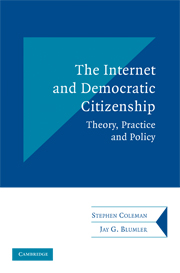Book contents
- Frontmatter
- Contents
- Acknowledgements
- Introduction: Anxiety and Optimism about Democracy
- 1 Democracy's Deliberative Deficit
- 2 A Crisis of Public Communication
- 3 From Indirect to Direct Representation
- 4 E-Democracy from Above
- 5 E-Democracy from Below
- 6 Shaping E-Democracy
- 7 Realising the Democratic Potential of the Internet
- Bibliography
- Index
- Titles in the Series
Introduction: Anxiety and Optimism about Democracy
Published online by Cambridge University Press: 05 June 2012
- Frontmatter
- Contents
- Acknowledgements
- Introduction: Anxiety and Optimism about Democracy
- 1 Democracy's Deliberative Deficit
- 2 A Crisis of Public Communication
- 3 From Indirect to Direct Representation
- 4 E-Democracy from Above
- 5 E-Democracy from Below
- 6 Shaping E-Democracy
- 7 Realising the Democratic Potential of the Internet
- Bibliography
- Index
- Titles in the Series
Summary
DIVERGENT ANXIETIES
A pervasive anxiety characterises liberal democracy in the early twenty-first century. As one leading British politician has put it, ‘The public, and particularly young people, now have less faith than ever in parliamentary democracy. We who constitute the “political class” conduct politics in a way that turns off our voters, readers, listeners and viewers … Too many people believe that government is something that is done to them’ (Hain 2003). It is not that democracy as such is out of favour – on the contrary, it has never been so widely adopted as a political model – but that citizens seem to be increasingly disenchanted by and disengaged from the processes and institutions of the democratic state. There is a widespread public feeling that government is remote, insensitive and untouchable; even if one takes the trouble to speak out, organise or respond to consultations, those who hold power are unwilling or unable to listen. According to the 2007 Audit of Political Engagement, conducted by the U.K. Electoral Commission and the Hansard Society, almost 4 out of 10 people disagree with the statement that ‘When people like me get involved in politics, they really can change the way the country is run’ (EC 2007a: 35). Interestingly, no difference in this low level of political efficacy was found between respondents who were political activists and those who did not participate.
- Type
- Chapter
- Information
- The Internet and Democratic CitizenshipTheory, Practice and Policy, pp. 1 - 13Publisher: Cambridge University PressPrint publication year: 2009



